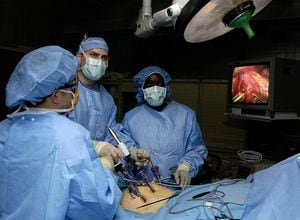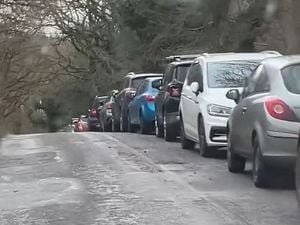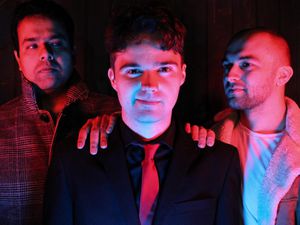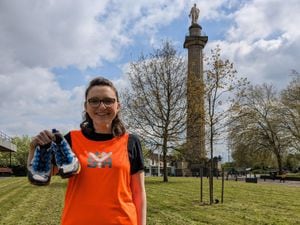Through the keyhole. The Shropshire medic who pioneered surgical procedure
It didn't sound like a life-changing event. David Evans, a consultant at Royal Shrewsbury Hospital, had been invited to a medical conference in London.

The keynote speaker was an American surgeon by the name of Jo Petelin, who was there to talk about gall bladder procedures.
But when the 100 or so assembled surgeons, were introduced to one of Petelin's patients, a woman who had her gall bladder removed three days earlier, their jaws dropped.
"A buzz went round the lecture theatre as she walked in, her bearing being completely normal," he says.
Normally it would be up to 10 days before a patient would be ready for discharge, but this woman, who showed no ill effects whatsoever, went home the day after the operation. The future of British surgery was in the room.
It was May, 1990, and Jo Petelin was one of the world's first practitioners of keyhole surgery.
Mesmerised by what he had seen, Mr Evans was determined to bring these procedures to Britain. What seemed like a routine meeting of medics would not only change the course of Mr Evans' career, it would transform our health service and change countless lives. And all with the help of a Shropshire farmer.
"I left the meeting exhilarated and excited, and determined to get off the ground," says Mr Evans, who has just written a book about his career as a surgeon.
He was told it would cost £100,000 to set up a theatre and receive the appropriate training, and Mr Evans began his single-minded pursuit of bringing keyhole surgery to Shropshire.
"I contemplated even trying to put up funding myself, and idea immediately and quite rightly vetoed by my wife who said family and education must come first.
"I talked around the hospital to see if there was any money in the equipment budget or in the region to finance this project. After a while I was recommended to try the League of Friends at the hospital who could help out in worthy projects when funds were available."
At the same time, a farmer from the Oswestry area – who by coincidence had been a patient of his – had bequeathed £400,000 to the Friends in his will after dying suddenly while on holiday in Australia. Mr Evans persuaded the group to give him the £100,0000 needed.
Just before Christmas 1990, just seven months after attending the conference in London, he performed his first two keyhole gall bladder removals.
"I remember when I was asking the League of Friends for the money, the salient question was 'If we give you the money for this equipment, will you be able to use it?'," he says.
"Those words were ringing in my ears as I prepared to do the first two operations in December 1990, and I was delighted to be able to ring the chairman of the League of Friends eight hours later to tell her both operations had been successful."
He says it quickly became clear that the techniques could be used to replace nearly every operation where open surgery was previously required.
"In some cases it would allow operations on patients who probably would not have survived an open procedure," says Mr Evans.
Within a couple of years, his work had come to the attention of Shrewsbury Town FC, and he was contacted by the club's medical officer who asked if he would look at veteran striker Wayne Clarke. The footballer, whose career had seen him also turn out for Birmingham City, Everton, Manchester City and Wolves, appeared to be in the early stages of a hernia.
Clarke was able to perform a full league match just 23 days after the operation which was carried out at Shrewsbury's Nuffield Hospital, at a time when players with his injury would normally be out for 12 weeks.
Word quickly got around, and over the years Mr Evans found himself treating a growing number of famous sports stars, including Aston Villa's Steve Stone and Dion Dublin and Wales rugby player Jonathan Davies.
The son of a surgeon, Mr Evans was born in London in 1935, and moved to Shrewsbury when he took up his first consultancy post in 1974. During the early years of his time in the county, he saw hospital services transformed with the construction of the new Royal Shrewsbury and Princess Royal Hospital in Telford.
He later moved to Cardington, but after retiring in 2000 he moved to Cerne Abbas, in Dorset.
He says over the 28 years since he attended that meeting in London, keyhole surgery has transformed the lives of countless of patients. And he says it would not have been possible without the help of the donation from the League of Friends.
"It has changed the experience for patients enormously," he says.
"It means we can do an operation today, keep them in overnight, and then discharge them the next day, whereas when we were doing open operations they would have been kept in for 7-10 days.
"It's better for the patient, because it means they don't experience the pain after open surgery, it helps the hospital and the NHS because you can get three people in a bed over the time that it would previously have been occupied by one patient."
While it was undoubtedly a period of rapid change, Mr Evans says they were not all for the better. He particularly disliked the growing informality in the relationship between nurses and patients.
"During my latter years, patients tended to be called by their first names," he says.
"This was a habit I disliked and and would not allow on formal ward rounds as, with increased familiarity, there appeared to be a drop in standards.
"I felt it was difficult to communicate sometimes unpleasant news if relationships were too chummy."
He also says that, around the same time, the nature of nursing was changing.
"Nursing, by this time, seemed to be centred round the desk with its computer rather than at the bedside, in some cases to the detriment of patient care."
He also voices sadness that he was not kept on after retirement in a training role, something he says he would have gladly done.
"As I left the hospital and subsequently, I could not help but think how profligate was the NHS in not keeping me on in a training capacity which I would willingly have undertaken," he says.
"I had spent 10-plus years at the forefront of this development only for the skill to be jettisoned.
"At that time there were only a few units in the country with this wealth of experience, and in a small way it could be likened to allowing a return to the Middle Ages."
*A Nurtured Passion, a Surgeon’s Life in Two Halves, by David Evans, is available on Amazon as a paperback or Kindle edition.





